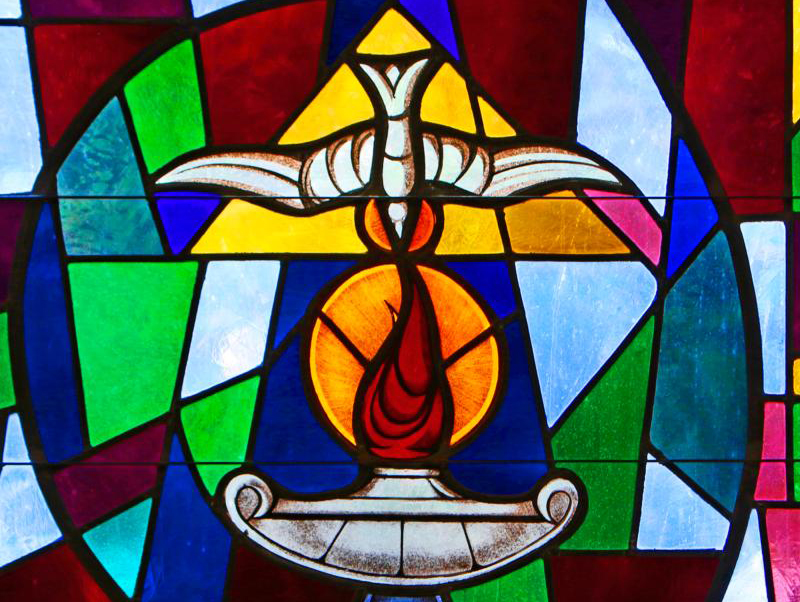
The Holy Spirit and a lantern’s flame symbolizing the sacrament of confirmation are depicted in a stained-glass window at Sts. Cyril & Methodius Church in Deer Park, N.Y. Wisdom is geared to making decisions that demonstrate awareness of what truly is at stake in situations involving oneself, others and the world. (CNS photo/Gregory A. Shemitz)
The people I know never call themselves “wise.” They may be wise, but they don’t say so. Possibly they fear sounding haughty.
Or possibly they don’t want to sound older than they are. Typical images of wise people depict them as aged beneficiaries of long experience with handling life’s realities.
But certainly young people can act wisely too. Youthful confidence in the future may combine with faith in life’s goodness to motivate both the young and old to offer the best they can to making it even better.
That’s important because, as the Catechism of the Catholic Church suggests, giving the best of ourselves lies at the heart of the virtues (No. 1803), and wisdom is virtuous. Wisdom is one of the seven gifts of the Holy Spirit that “complete and perfect the virtues of those who receive them,” the catechism observes (No. 1831).
Common notions of wisdom tend to reduce it to a set-in-stone quality “possessed by” those who know what to do and when to do it. The wisdom Christian tradition speaks of seems more multidimensional than that, however.
Wisdom moves people into action, but not the reckless action of those who rush in where angels fear to tread. Wisdom is geared to making decisions that demonstrate awareness of what truly is at stake in situations involving oneself, others and the world, situations that call us all to give the best of ourselves.
Rushing in to solve problems without first hearing the voices of those we’re attempting to aid is rarely wisdom’s method.
[hotblock]
“I am always wary of decisions made hastily,” Pope Francis said in a 2013 interview with La Civilta Cattolica, the Jesuit order’s Rome journal. He is wary of “the first thing that comes to my mind if I have to make a decision. This is usually the wrong way.”
Instead, he continued, “the wisdom of discernment redeems the necessary ambiguity of life and helps us find the most appropriate means, which do not always coincide with what looks great and strong.”
In simpler terms, wisdom means exercising good judgment. It calls for a willingness to discover, to discern what a situation staring us in the face involves and what others genuinely need, not solely what we need or want.
All kinds of circumstances deserve wisdom’s benefits. So no single example of wisdom explains all that this gift encompasses.
As a father and grandfather, I sense that wisdom is of the essence in parenthood. Few parents, if any, feel wise all the time, however.
(Related: A taxi ride with the Holy Spirit)
Parenthood unfolds over decades, traversing a course that is alternately joyful and confounding, replete with moments to celebrate or lament. Moreover, sorrow and grief are not strangers to parenthood.
A parent’s journey cries out for wisdom. Parents do not aim to fail children, but that’s not the same as saying parents get to feel successful at every turn of the road.
Parents are given little choice but to become people of hope. Their long journey tugs at them to remain confident that the big issues they experience along the way do not spell doom. Yet hope is not naive.
[tower]
Parents also are given little choice but to adopt a posture of patience. Parents learn to wait. At times they wait to grasp how their child is unique and to see who this child is becoming, not just at the age of 5 or 10, but the ages of 15, 20 and beyond.
Yes, there are times in a child’s growing, expanding life when the knee-jerk decisions Pope Francis cautioned against can run afoul of the young person growing and emerging before a parent’s very eyes.
I still appreciate the way my down-to-earth father accepted my brother’s emerging, plain-to-see artistic talent when he was about 16. I doubt it was what our father expected of his oldest child, who one day would become an art professor.
It is difficult “to give the best of ourselves” in situations involving others if we never attempt to recognize, to discern, our own best strengths, our gifts. Thankfully, for parents this discernment tends to bring to the surface a gift for loving their children. Parents are wise, I believe, not to underestimate that gift’s inherent worth and wisdom.
I would not want to create any impression that people who act wisely must act alone or make decisions in solitary ways. Wisdom is a gift for sharing insights in conversation with others and, whenever possible, learning and acting together.
Like every blessing of God, wisdom also is a mandate, a commission to reach beyond ourselves, bringing something good to others and our world.
In encouraging an audience he addressed to put the gifts of the Holy Spirit to good use, Archbishop Wilton D. Gregory of Washington once said:
“May all of us who belong to Christ, in the many different ways we have been incorporated into him, have the wisdom to recognize the special gifts we have been given and the courage to use them for the building-up of the body of the Lord.”
***
Gibson served on Catholic News Service’s editorial staff for 37 years.



Share this story